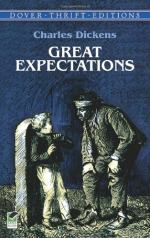“Good-bye, dear Joe! — No, don’t wipe it off — for God’s sake, give me your blackened hand! — I shall be down soon, and often.”
“Never too soon, sir,” said Joe, “and never too often, Pip!”
Biddy was waiting for me at the kitchen door, with a mug of new milk and a crust of bread. “Biddy,” said I, when I gave her my hand at parting, “I am not angry, but I am hurt.”
“No, don’t be hurt,” she pleaded quite pathetically; “let only me be hurt, if I have been ungenerous.”
Once more, the mists were rising as I walked away. If they disclosed to me, as I suspect they did, that I should not come back, and that Biddy was quite right, all I can say is — they were quite right too.
Chapter 36
Herbert and I went on from bad to worse, in the way of increasing our debts, looking into our affairs, leaving Margins, and the like exemplary transactions; and Time went on, whether or no, as he has a way of doing; and I came of age — in fulfilment of Herbert’s prediction, that I should do so before I knew where I was.
Herbert himself had come of age, eight months before me. As he had nothing else than his majority to come into, the event did not make a profound sensation in Barnard’s Inn. But we had looked forward to my one-and-twentieth birthday, with a crowd of speculations and anticipations, for we had both considered that my guardian could hardly help saying something definite on that occasion.
I had taken care to have it well understood in Little Britain, when my birthday was. On the day before it, I received an official note from Wemmick, informing me that Mr. Jaggers would be glad if I would call upon him at five in the afternoon of the auspicious day. This convinced us that something great was to happen, and threw me into an unusual flutter when I repaired to my guardian’s office, a model of punctuality.
In the outer office Wemmick offered me his congratulations, and incidentally rubbed the side of his nose with a folded piece of tissuepaper that I liked the look of. But he said nothing respecting it, and motioned me with a nod into my guardian’s room. It was November, and my guardian was standing before his fire leaning his back against the chimney-piece, with his hands under his coattails.
“Well, Pip,” said he, “I must call you Mr. Pip to-day. Congratulations, Mr. Pip.”
We shook hands — he was always a remarkably short shaker — and I thanked him.
“Take a chair, Mr. Pip,” said my guardian.
As I sat down, and he preserved his attitude and bent his brows at his boots, I felt at a disadvantage, which reminded me of that old time when I had been put upon a tombstone. The two ghastly casts on the shelf were not far from him, and their expression was as if they were making a stupid apoplectic attempt to attend to the conversation.
“Now my young friend,” my guardian began, as if I were a witness in the box, “I am going to have a word or two with you.”




